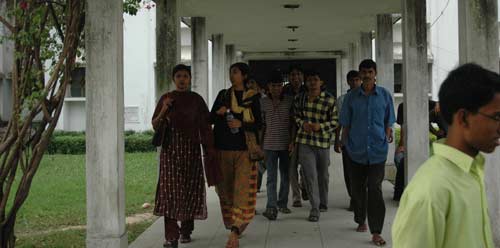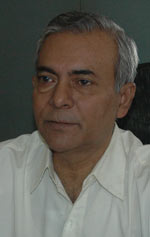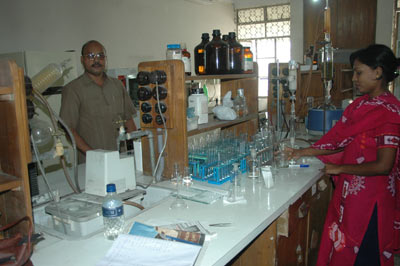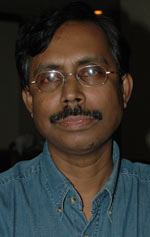SWEDISH SOUTH ASIAN STUDIES NETWORK
Visit to the Department of Chemistry, Dhaka University, Sunday 4 December 2005
Dhaka University web page: http://www.univdhaka.edu/
Department of Chemistry web page: http://www.univdhaka.edu/department/index.php?bodyid=CHM
 |
| Students at the Dept. of Chemistry, Dhaka University |
Dhaka University, established in 1921, is the largest university in Bangladesh with about 1 300 teachers and 28 000 students from undergraduate to PhD levels. It currently has 10 faculties (Arts, Biological Science, Business Studies, Education, Law, Medicine, PGMR, Pharmacy, Science, and Social Science) with a total number of 51 departments. Besides there are nine separate institutes and 18 research centres.
We visited Dhaka University already during our contact journey in 2002, but then the visit was limited to the Faculty of Social Science, and meeting staff from the departments of Sociology and Political Science only (see http://www.sasnet.lu.se/bangmeet.html, and http://www.sasnet.lu.se/dhakmeet2.html).
 This
time our visit was devoted to visit the Faculty of Sciences. Its departments
are located in the historic Curzon Hall in Ramna (built in 1905 by Lord
Curzon, the then Governor General of British India, to be the town hall,
but was later taken taken over by the Dhaka University) and other newer
buildings in its close vicinity. More specifically our destination was
the Dept. of Chemistry, where we had an appointment to meet Professor
M. Mosihuzzaman (photo
to the right), to whom we had been introduced by Dr. Malin
Åkerblom, International Science
Programme (ISP) at Uppsala University. ISP has been involved in a
long-standing collaboration with the Dept. of Chemsitry at Dhaka University,
and given substantial support with material and training.
This
time our visit was devoted to visit the Faculty of Sciences. Its departments
are located in the historic Curzon Hall in Ramna (built in 1905 by Lord
Curzon, the then Governor General of British India, to be the town hall,
but was later taken taken over by the Dhaka University) and other newer
buildings in its close vicinity. More specifically our destination was
the Dept. of Chemistry, where we had an appointment to meet Professor
M. Mosihuzzaman (photo
to the right), to whom we had been introduced by Dr. Malin
Åkerblom, International Science
Programme (ISP) at Uppsala University. ISP has been involved in a
long-standing collaboration with the Dept. of Chemsitry at Dhaka University,
and given substantial support with material and training.
Prof. Mosihuzzaman (called Zaman) has together with a group of dedicated
scientists at his department developed two research programmes in collaboration
with Swedish researchers and institutions. The first programme dealt with
research on natural products, especially medicinal plants, and was developed
in collaboration with the Swedish University of Agriculture (SLU), Ultuna,
Uppsala, and the Dept. of Molecular Cell Biology at Uppsala University.
The programme has now developed into an International network in Africa,
Asia and South America (AFASA), and the plan is to establish an International
Centre for Natural Product Research in Dhaka (ICNPR).
The second programme is research on pollutants in food and environment.
It was started in collaboration with SLU but has now developed into a
network with many Swedish institutions, including the Department
of Environmental Chemistry, Wallenberg Laboratory, Stockholm University
(counterpart Prof. Åke Bergman) and
AnalyCen Laboratory in
Lidköping.
A first task has beeen to study organochlorine pesticide residues in fifteen
fish and fifteen vegetable samples from Bangladesh. The residues found
were not alarming and within acceptable daily intake given by the WHO.
In dry fish including shrimps, however, DDT and its metabolites were detected.
The suspicion is that DDT, banned in Bangladesh, is smuggled from India
and sold and used illegally. Another source could be a closed down DDT
factory in Chittagong, which has a stockpile of DDT, which may still be
sold. ‘We are famous for corruption,’ as Prof. Mosihuzamman
wryly comments.
 Studies
now concentrate on a more systematic sampling of the above items and the
residues of antibiotics in shrimps. Fish and shrimp export is the second
biggest export item in the national economy, second only to garments.
Some shipments have actually been rejected by US and European buyers and
this is a cause of great concern. In these studies, the department cooperates
with the relevant Ministries, a trade association of fish exporters, and
an NGO engaged in promoting fish export. But they also need foreign collaboration
especially when it comes to the supply of sophisticated technical equipment,
since the residues are miniscule and hard to discover with traditional
chemical analysis.
Studies
now concentrate on a more systematic sampling of the above items and the
residues of antibiotics in shrimps. Fish and shrimp export is the second
biggest export item in the national economy, second only to garments.
Some shipments have actually been rejected by US and European buyers and
this is a cause of great concern. In these studies, the department cooperates
with the relevant Ministries, a trade association of fish exporters, and
an NGO engaged in promoting fish export. But they also need foreign collaboration
especially when it comes to the supply of sophisticated technical equipment,
since the residues are miniscule and hard to discover with traditional
chemical analysis.
The department has set up an Organic Pollution Research Centre, in operation
since November 2005. The Centre has been given a strong positive evaluation
by ISP and they hope for technical and financial support from abroad.
Two other research programmes carried out at the Dept. of Chemistry are also noticeable: one programme on antidiabetic plant research, that had developed into an International network called ANRAP, Asian Network of Research on Antidiabetic Plants (more information on ANRAP), and another research programme on arsenic in well water. A workshop on the latter issue was going to be be held on 11 December 2005 in Dhaka.
There are two prominent co-workers of Prof. Mosihuzamman with Swedish connections: Prof. Altaf Hussain, who took his PhD in Sweden in 1978 (read his biodata), and Prof. Nilufar Nahar, who was the first of a number of 18 Bangladeshi students who have received a sandwich training in Sweden for the PhD degree. This is also an important part of the long standing cooperation with institutions in the Stockholm-Uppsala region (supported by ISP). Both Prof. Hussain and Prof. Nahar were in fact on a visit to Sweden for training in new types of analysis technique, so we could not meet them in their department in Dhaka.
 After
our meeting in Prof. Mosihuzamman’s office we were given the opportunity
to see the department’s advanced laboratories and equipments partly
being provided from Sweden.
After
our meeting in Prof. Mosihuzamman’s office we were given the opportunity
to see the department’s advanced laboratories and equipments partly
being provided from Sweden.
Finally, Prof. Mosihuzamman hosted a delicious lunch at a Chinese restaurant in downtown Dhaka, to which also Dr. Kazi Matin Ahmed (photo to the left), Professor at the Department of Geology participated. Dr. Ahmed is presently involved in a Linnaeus-Palme students and teachers exchange programme with the Department of Land and Water Resources Engineering at the Royal Institute of Technology (Swedish counterpart is Prof. Prosun Bhattacharya, well known to us in the SASNET network).
SASNET - Swedish South Asian Studies Network/Lund
University
Address: Scheelevägen 15 D, SE-223 70 Lund, Sweden
Phone: +46 46 222 73 40
Webmaster: Lars Eklund
Last updated
2006-02-13
